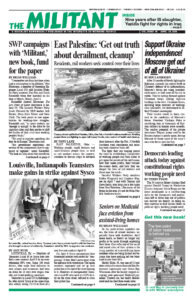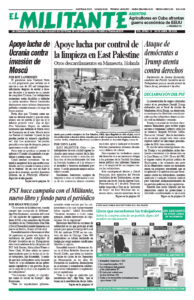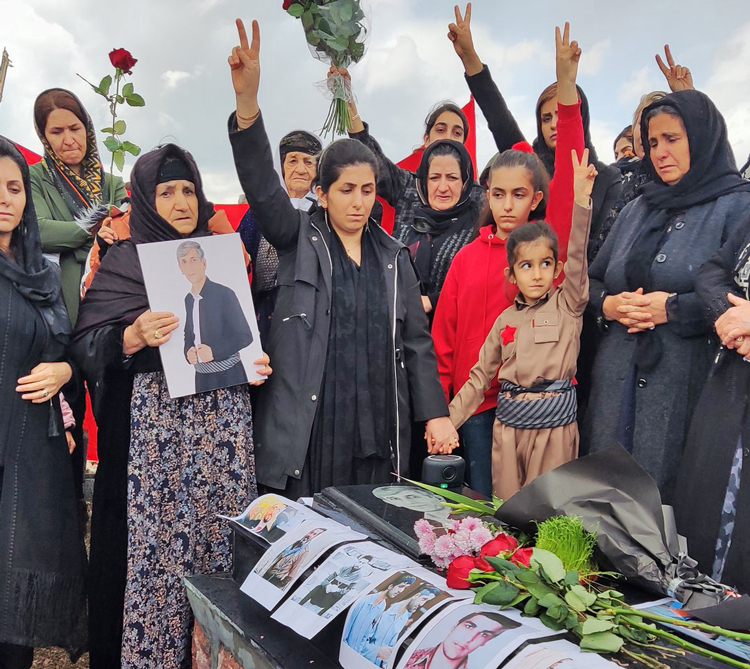The reactionary capitalist government in Iran is trying to reimpose its dress code for women and beat back the widespread political debate that exploded after the hated morality police took Zhina Amini, a young Kurdish woman, into custody, leading to her death. But opposition to the regime’s attacks on democratic and political rights continues to percolate.
The regime had backed off from enforcing the dress code — which requires women to completely cover their hair — after five months of mass “Women, life, freedom” protests. These actions — brutally attacked by the regime — have largely subsided.
More than 22,000 protesters were arrested and more than 500 killed by the Shiite-based regime’s repressive forces, especially in areas populated by oppressed nationalities and Sunni Muslim minorities, including the Kurdish and Baluch regions. The government claims that most of those arrested in the protests have been released.
But the government’s threat to reassert the dress code is not having the desired effect.
A video of an attack in Mashhad on a young woman who was not wearing a hijab and her mother, whose hair was partially exposed, went viral March 31. They had been followed into a store by a man who insisted they cover up their hair. When they turned away from him, he picked up a bucket of yogurt and dumped it on their heads.
He was pushed out of the store by store workers outraged at his thuggery.
The next day the thug was arrested for “disturbing public order,” as were the two women. Store owner Mahmoud Hajarpour was arrested and then released on bail and his store briefly shut down.
Flowers for opposing regime thug
But Amir Shahla, a former member of the Mashhad City Council, says “customers from near and far have gone to Mr. Hajarpour’s dairy and the shop is full of flowers, chocolates and sweets” in an outpouring of support for the store owner’s defense of the women.
The regime responded, with Iran’s Judiciary announcing that “unveiling is tantamount to enmity with our values.” Women violating the diktat “will be punished and will be prosecuted without mercy.”
Despite the regime’s repeated threats to enforce the code, women without hijab joined in dancing along side their hijab-clad friends and relatives during the 13-day celebration of Nowruz, the Iranian and Kurdish New Year, with little controversy. Nowruz began March 21, marking the beginning of the Iranian year 1402. On the last day people all over the country join in outdoor festivals.
The Nowruz tradition includes visits to the graves of loved ones. This year they reflected the deep opposition to the bourgeois clerical regime’s repression. On March 21 a stream of people brought flowers, pastries and other gifts for the dead, commemorating those killed in the recent protests or executed by the regime, as well as for those killed during mass protests in cities and rural areas across the country in 2018 and 2019.
At two cemeteries just outside Tehran, handwritten notes were placed on the graves. “Very soon, instead of tears of mourning, we will pour out tears of joy, tears of victory,” read one.
“The year 1402 is the year of consciousness and diligence,” read another. At one grave there was a composite photograph of some 40 youth who have been killed by the regime.
At the gravesite of Zhina Amini in Saqqez in the Kurdish region, scores of mourners put their hands in the air and chanted “Women, life, freedom” in Kurdish along with slogans demanding equal rights for Kurds and other oppressed nationalities.
28 weeks of protest in Baluchistan
The 28th consecutive week of mass protests after Friday prayers took place April 7 in Zahedan in Sistan-Baluchistan. The province is home to the Baluch people, one of the Iran’s oppressed nationalities. Prominent Sunni cleric Maulana Abdul-Hamid has repeatedly called for freeing all political prisoners, an end to torture and for equal rights for all who live in Iran.
On March 31 Abdul-Hamid noted that during mass protests in Israel against the government’s judicial “reform” plan, demonstrators were not shot by the police. But in Iran, he said, peaceful protesters are fired on with “live ammunition and shotguns.”
On April 7 Abdul-Hamid called the beating days earlier of Palestinian worshipers by Israeli police at the Al Aqsa Mosque in Jerusalem, “disrespect to God’s house.” But he added, anyone who is extreme “creates problems for himself.”
Unlike the Iranian government, which calls for the destruction of Israel, Abdul-Hamid calls for negotiations and a “fair agreement” that would lead to peace between Israel and an independent Palestinian state. “Some have criticized why you say peace,” he said. But “we have said a just peace, where rights are respected.”


